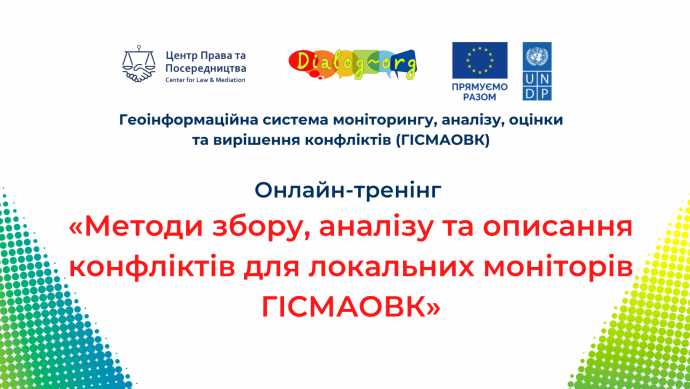Online training "methods of collecting, analyzing and describing conflicts for local monitors of the Geographic Information System for monitoring, analyzing, evaluating and resolving conflicts (GISMAOVK)"

We are announcing the recruitment of participants and participants to participate in the online training “methods of collecting, analyzing and describing conflicts for local monitors of the Geographic Information System for monitoring, analyzing, evaluating and resolving conflicts (GISMAOVK)”, which will be held on August 22-23, 2022 online (Zoom app).
The training is the first module of comprehensive training of local monitors “monitoring and analytical component of the GISMAOVK resource“.
The purpose of the training is to train a team of local monitors, provide them with the basic knowledge necessary for collecting, analyzing and describing conflicts in the Geographic Information System for monitoring, analyzing, evaluating and resolving conflicts (“GISMAOVK”).
A team of local monitors has been formed to work in Dnipropetrovsk, Donetsk, Zaporizhia, Ivano-Frankivsk, Luhansk, Lviv, Kharkiv, and Chernivtsi regions to monitor conflicts in communities, fill in the GISMAOVK system, and popularize the mediation method to resolve them.
The training program will cover the following topics: determining conflict parameters, escalation stages, conflict development scenarios and forecasting; conflict assessment (primary cross-section, assessment forms, methods, forecasting tools); working with conflict early warning signals, ethics of the local monitor of the GISMAOVK system; information support of the conflict.
Based on the results of the training, participants and participants will be selected for the team of local monitors of GISMAOVK, which will be involved in monitoring conflicts in the Dnipropetrovsk, Donetsk, Zaporizhia, Ivano-Frankivsk, Luhansk, Lviv, Kharkiv, Chernivtsi regions.
For more information about the Geographic Information System for monitoring, analyzing, evaluating, and resolving conflicts, please follow the linkhttps://dialog-ua.org/pages/about.html
It is expected that at least 20 people will be selected from Dnipropetrovsk, Donetsk, Zaporizhia, Ivano-Frankivsk, Luhansk, Lviv, Kharkiv, and Chernivtsi regions.
To participate in the training, applicants must fill out a questionnaire by 18:00 on August 19, 2022 at the link https://forms.gle/y5uZzJFgabs4mcYM7 and attach a motivation letter and resume to the questionnaire.
Please note that these documents must be prepared in advance to be attached to this questionnaire.
When evaluating submitted applications, the weight of the justification of interest will be taken into account. Preference will be given to candidates who confirm their readiness to work after completing their studies in the GISMAOVK project.
If you have any additional questions, please contact Galina Bozhenko, coordinator of the GISMAOVK network of analysts, by email halina.bozhenko@gmail.com.
The event was organized by the NGO «Center for law and mediation» within the framework of the project «functioning and implementation of GISMAOC in the communities of Donetsk, Luhansk, Zaporizhia, Kharkiv, Dnipropetrovsk, Chernivtsi, Lviv and Ivano-Frankivsk regions» with the support of UNDP within the framework of the UN program for the restoration and development of peace with financial support from the Government of the Kingdom of the Netherlands.
The United Nations Programme for the reconstruction and development of peace is implemented by four United Nations agencies: the United Nations Development Programme (UNDP), the United Nations Framework for gender equality and women's empowerment (UN Women), the United Nations Population Fund (UNFPA) and the Food and Agriculture Organization of the United Nations (FAO).
The program is supported by twelve international partners: the European Union, the European Investment Bank, as well as the governments of Great Britain, Denmark, Canada, the Netherlands, Germany, Norway, Poland, Sweden, Switzerland and Japan.

